What was the need for Xi Jinping, General Secretary of the Chinese Communist Party, President of the People's Republic of China and Chairman, Central Military Commission, to don the new role of Commander in-Chief?
Does this mean that the most powerful Chinese leader since Mao faces numerous threats from within the Communist Party?
Claude Arpi decodes the signals coming from Beijing.
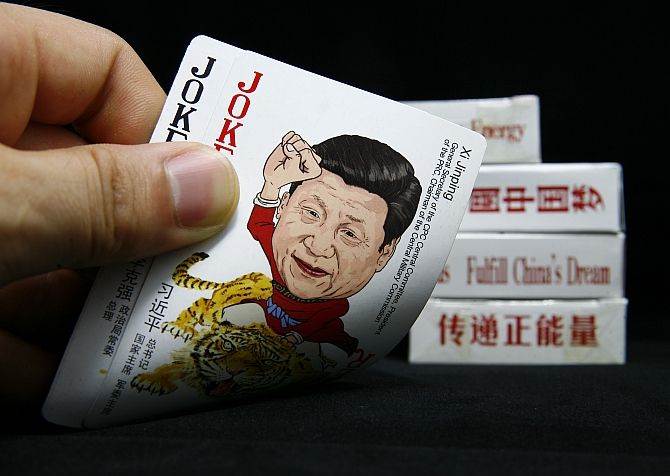
Xi Jinping appears to be more and more the lonely man of China.
His latest move to nominate himself as Commander-in-Chief of the People's Liberation Army's Joint Battle Command, while appearing on State media in a camouflage uniform, displays growing insecurity at the top.
According to CCTV, Xi stated that the new command should be 'absolutely loyal (to him!), resourceful in fighting, efficient in commanding, and courageous and capable of winning wars.'
Xu Guangyu, a retired PLA major general, told The South China Morning Post: 'Xi's camouflage military suit showed that he is top commander of the PLA's supreme joint battle command body, and is capable of commanding land, navy and air forces, as well as other special troops like the Rocket Force and Strategic Support Force.'
Why does Xi need put on another hat when he is already Chairman of the all-powerful Central Military Commission?
Simply because he may not be fully in control of the CMC.
It is true that the PLA 'reforms' are extremely ambitious and changing an ingrained corrupt system is not easy, in China or elsewhere.
To add to the Chinese president's woes, the Panama Papers named his brother-in-law, who is said to have established some offshore firms. Though these companies went dormant before Xi came into power, the damage was done: For the International Consortium of Investigative Journalists who investigated the Panama-based law firm Mossack Fonseca, Xi's name is indirectly linked.
Already in June 2012, The New York Times and Bloomberg had exposed Xi's family: 'As Xi climbed the Communist Party ranks, his extended family expanded their business interests to include minerals, real estate and mobile-phone equipment,' Bloomberg noted.
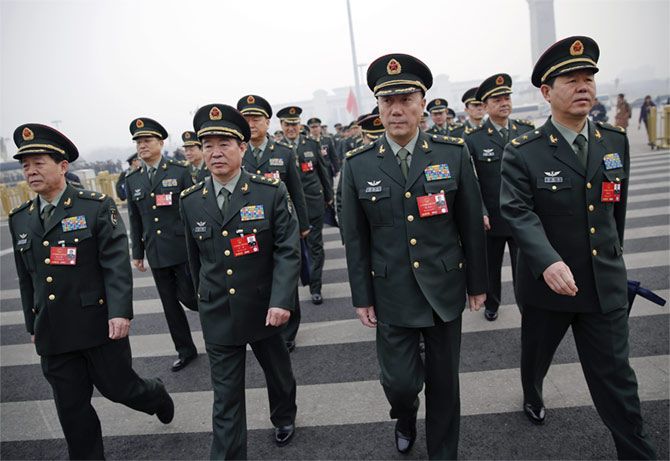
Probably more worrisome for Xi, the Middle Kingdom is sailing through rough weather and in the months to come, we may witness fireworks in the Chinese Communist Party.
The Nikkei in Japan reported a verbal 'jab' between Xi and Yu Zhengsheng, the chairman of the Chinese People's Political Consultative Conference during the recently concluded Two Sessions at the Great Hall of the People in Beijing.
During the 19th Congress to be held in November 2017, five of the seven members of the Politburo Standing Committee -- the highest body in the Chinese Communist Party -- are expected to retire.
The Nikkei quoted an old China hand: 'Signs of discord within the Politburo Standing Committee have now emerged. The rift may come to the surface over the committee seats.'
Does it mean that everything is not harmonious in the Land of Confucius?
On March 14 during the concluding session of the Chinese People's Political Consultative Conference, Yu Zhengsheng, who is also a member of the Politburo Standing Committee, had apparently fired the first shots at Xi.
During his concluding remarks, Yu dared to deviate from the official line: The Communist leadership had agreed to uphold 'Four Consciousnesses' related to 'politics, the bigger picture, the core and consistency.'
Yu spoke of only three: The need to further enhance the consciousness of politics, the consciousness of the bigger picture and the consciousness of responsibility.
What about the 'consciousness of the core and the consciousness of consistency' (in following 'the core leader')?
Observers believe that Yu showed his disagreement with Xi when he brought up a 'new consciousness,' that of 'responsibility' and omitted 'the core.'
In his opening speech on March 3, Yu spoke of the differences of views and perceptions which can arise over specific issues and stressed the need to seek 'consistency', while respecting 'diversity.' What 'diversity'? Yu left it undefined.
Yu also looks after the United Front Department, whose role is to 'unite' the Party. He is also in charge of Tibet and Xinjiang, China's most restive provinces.
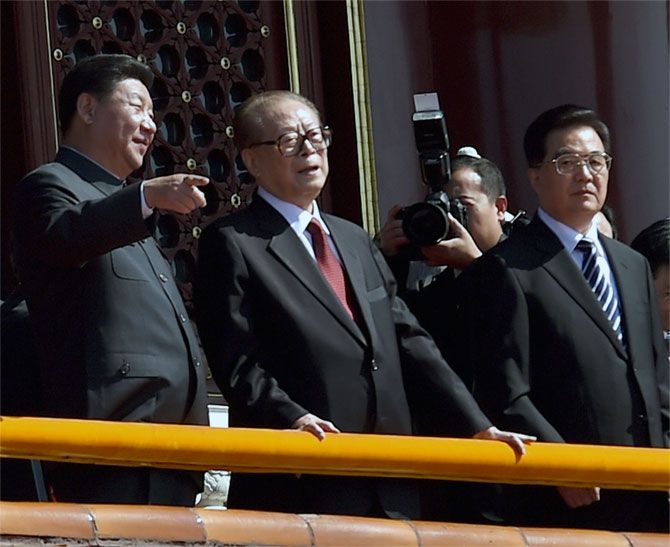
This comes after an open letter attacking Xi and asking for his resignation was published on a website Wujie News. The letter was entitled: 'A Request for Comrade Xi Jinping to Resign from Leadership Positions in the Party and the State.'
It blamed Xi for many negative events in China and asked him to step down. It was, of course, quickly removed from the Wujie website.
Wujie claimed that the article had been posted by a hacker.
Wujie is a joint venture of the SEEC Media Group Limited (the parent company of Caixing magazine), the Xinjiang government and Jack Ma's Alibaba Group.
Was it the act of a hacker?
With Alibaba hosting the site, it is considered the safest hosting service in China. So what happened?
Could Wujie have published the letter on its own? Difficult to say, but the website was subsequently shut down for several days.
Obviously, Xi does not have only friends and comrades in the Communist Party.
According to The Digital Times, on March 29, while Xi was attending the Nuclear Summit in Washington, DC, a second letter calling for Xi's impeachment started circulating on the internet; the letter was titled 'An Open Letter to the Entire Party, the Army, and the People, Calling for the Immediate Impeachment of Xi Jinping and His Removal from All Posts Inside and Outside of the Party.'
For the Mingjing, a weekly magazine, some 171 Communist Party members had signed the letter which was later removed from Mingjing' website, though it continued to be on some Chinese blogs. The petition alleged that Xi had committed five categories of crimes and demanded his immediate dismissal.
Party members were asked to vote for a new leader at the 19th Congress in November 2017.
Should all this be taken seriously?
The speed with which the letters were removed seems to indicate that Beijing takes it seriously.
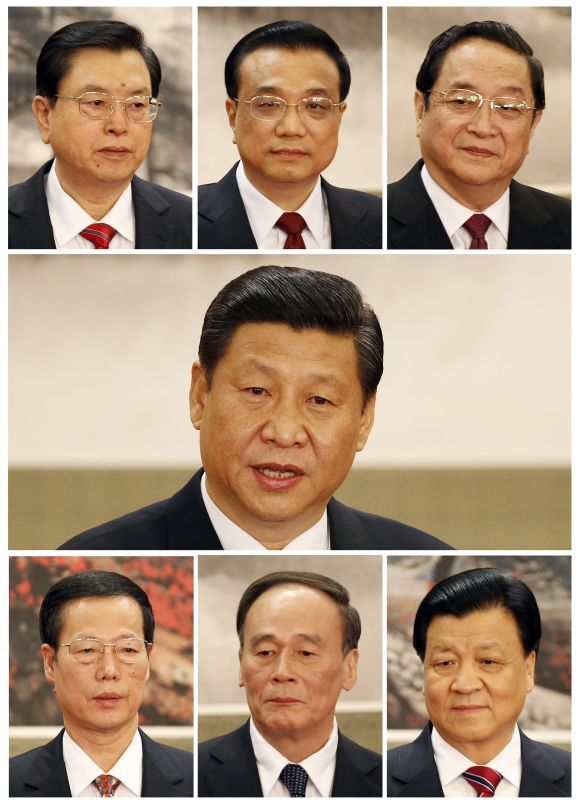
The reputed China watcher, Orville Schell commented on the present state of affairs in the Middle Kingdom: 'As different leaders have come and gone, China specialists overseas have become accustomed to reading CPC tea leaves as oscillating cycles of political "relaxation" and "tightening:... But what has been happening lately in Beijing under the leadership of Xi Jinping is no such simple fluctuation. It is a fundamental shift in ideological and organisational direction that is beginning to influence both China's reform agenda and its foreign relations.'
Schell's reading is that: 'At the centre of this retrograde trend is Xi's enormously ambitious initiative to purge the Chinese Communist Party of what he calls "tigers and flies," namely corrupt officials and businessmen both high and low.'
Very few observers are, however, ready to criticise him; most of them want to protect their own interests or their opportunity to work in China.
Last year, another renowned American 'China hand' David Shambaugh published an article 'The Coming Chinese Crackup' in The Wall Street Journal, in which the scholar mentioned his worries for Xi's regime.
On March 1, he backtracked in The Global Times.
'In the past year,' Shambaugh now explains, 'because of that article, many Chinese friends no longer treated me as an "old friend." Many Chinese media criticised me. No one invited me to visit China. All of these things upset me.'
Beijing knows how to twist its friends' arms.
Today, Shambaugh conveniently blames the editor of The Wall Street Journal: '(the title) was not from me.... They wanted to attract more readers' eyeballs and create more profit for the newspaper.'
Now, the US scholar is defending Xi: 'I have stated clearly that anti-corruption is good. I am all for it. It is the right thing to do and the public has received it very well. I give a thumbs up to Xi Jinping and Wang Qishan's anti-corruption fight.'
'Corruption is the cancer that erodes the Party, the government, the economy, and society. It must be taken care of otherwise it will lead to the downfall of the CPC.'
Many 'watchers' will follow Shambaugh's footsteps, but the point remains that China is nervous and shaky.
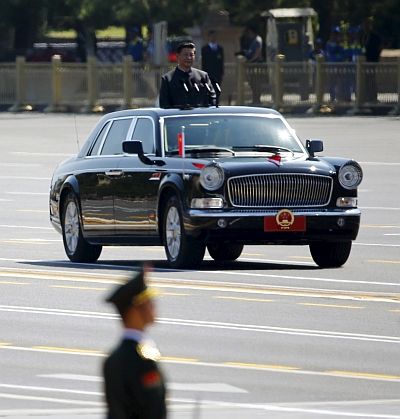
Just take the historical interpretation of the Cultural Revolution; a Global Times editorial, ahead of the 50th anniversary of the political upheaval, warned: 'Reflections are normal ... but they should not add or change the official political verdict.' The Editor insisted that 'the profoundness of the official verdict on history could not be paralleled by sporadic ideas by individuals.'
A few weeks ago, former culture minister Wang Meng argued that the party and Chinese intellectuals had a responsibility to 'further explain' the campaign.
Now The Global Times says: 'If China brings up a wave of reflections and discussions (on the Cultural Revolution) as wished by some, the established political consensus will be jeopardised and turbulence in ideas may occur.' It warned those using the Cultural Revolution by linking it to current issues and those who predict that the Cultural Revolution can return.
Another worrying sign is that China is installing a nationwide system of social control known as 'grid management.' The Financial Times noted that it is 'a revival of State presence in residential life that had receded as society liberalised during recent decades.'
'From smog-blanketed towns on the North China Plain to the politically sensitive Tibetan capital of Lhasa, small police booths and networks of citizens have been set up block by block to reduce neighbourhood disputes, enforce sanitation, reduce crime -- and keep an eye on anyone deemed a troublemaker,' the newspaper explained.
If you don't agree, you may be labeled a 'troublemaker.' Be ready to pay the consequences.
Xi Jinping seems very lonely on the rarefied summit of Zhongnanhai, the secretive seat of the Communist Party of China. How long he can survive alone is a serious question.











 © 2025
© 2025